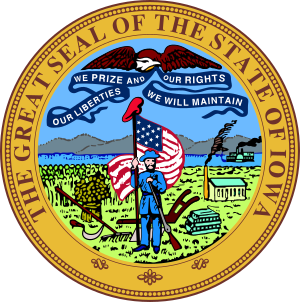Discover Your Roots
SIGN UPDiscover Your Roots
SIGN UPThe first name Iowa is of Native American origin and is primarily used for females. It means "Beautiful Land." This name is closely associated with the state of Iowa, which is located in the upper Midwestern region of the United States. The state is known for its rich history, diverse culture, and significant contributions to national politics. Iowa has a notable reputation for its high levels of voter turnout and leadership in civil rights, including early support of black suffrage, women's rights, and same-sex marriage. The name Iowa carries a sense of natural beauty and cultural significance, reflecting the values and heritage of the Native American origins.

The Iowa House of Representatives is the lower chamber of the Iowa General Assembly and is comprised of 100 seats representing single-member districts across the state. Members serve two-year terms with no term limits. The House is presided over by the Speaker of the House, who controls the flow of legislation and committee assignments. The majority and minority leaders are elected by their respective party caucuses. Committee leadership consists of chairs and vice chairs from the majority party, with the ranking members representing the minority party. Notable past members include William S. Beardsley, Terry Branstad, and Chuck Grassley. To qualify as a state representative, one must be at least 21 years old, a U.S. citizen, an Iowa resident for at least one year, and a district resident for 60 days prior to election. The Iowa House of Representatives plays a critical role in shaping the state's legislative landscape and policies.

The Iowa Sisterhood was a groundbreaking group of women ministers who played a pivotal role in organizing eighteen Unitarian societies across the Great Plains during the late 19th and early 20th centuries. Led primarily by Mary Augusta Safford, this remarkable group included influential figures such as Eleanor Gordon, Florence Buck, and Eliza Tupper Wilkes. Despite the prevailing challenges and lack of support, these women defied societal norms and claimed their rightful place as ordained ministers, contributing to the transformation of Unitarianism between 1880 and 1930.The Sisterhood's non-academic, pastoral approach brought a fresh perspective to their churches, extending the traditional role of women beyond the domestic sphere and into the church. They emphasized the importance of family matters and sought to make their churches extensions of the domestic hearth, hosting social events and domestic arts classes seven days a week. Although the Sisterhood faced resistance and limited recognition within the Unitarian clergy, their unwavering commitment to ministering and advocating for women's rights left a lasting impact.While their movement was not extensive or long-lasting, the Iowa Sisterhood set an inspiring example of women called to minister and men called to support their work, leaving a legacy that continues to resonate in the realm of Unitarianism and beyond.



All images displayed on this page are sourced from Wikipedia or Wikimedia Commons.We use these images under their respective Creative Commons or public domain licenses. Wherever applicable, author attributions and license information are provided. If you believe an image is used incorrectly or outside its license terms, please contact us so that we can review and correct the issue.